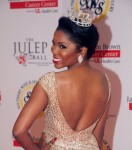Get To Know The Southern Beauty Queen Who Blew Up The Blogosphere When She Came Out Back in February.
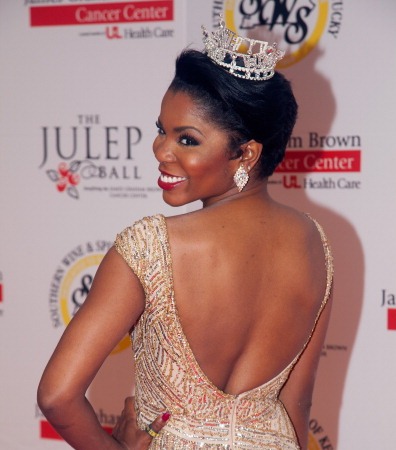
(Joey Foley / Getty Images Entertainment)
Andrea: You’re a Georgia girl. What was it like growing up in Columbus, Georgia?
Djuan: Columbus is a very slow and settled town. It’s a city that’s great for settling down and raising a family. My grandparents did a great job in raising my brother and me. We were raised in a very conservative Christian home, we went to church, as well as a conservative Baptist school… Growing up there were a lot of people who saw the potential that I had but I wasn’t confident enough at the time in myself to see life outside of Columbus but I ultimately made the decision to leave Columbus for school.
Andrea: That was when you left for college?
Djuan: Yes, I went to Berea College.
Andrea: What did you study in school?
Djuan: I started out as an Education major. My roommate at the time had the same major and was a year ahead of me. She would bring home mounds and mounds of books every night. After seeing her, I decided to reconsider my major and I ended up going with Theatre Performance…Mid-way through my junior year I realized that I didn’t really need a degree to act but at that point I would have been too far behind if I switched majors. I thought I was going to do the whole New York thing [laughs] but I ended up not doing that.
Andrea: You talked earlier about religion and the role it played in your adolescence. How important is religion is your life?
Djuan: Honestly, I’ve kinda let religion out of my life. I embrace spirituality, I do believe in God and I know there’s a higher being but I don’t necessarily stick to the traditional teachings that I was taught growing up. The more people I meet and the more exposed I am to different teachings, the more relatable each religion becomes and it’s hard for me to think that just one religion is the only “right one”.
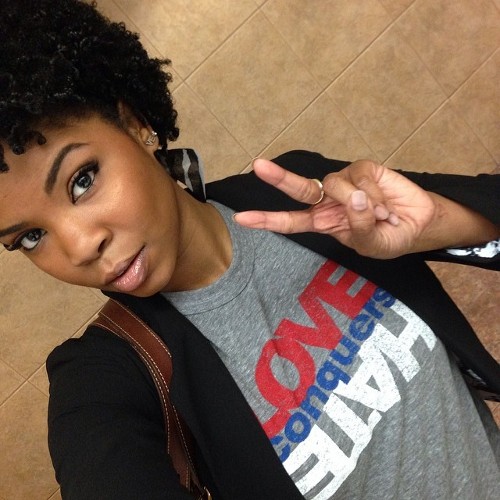
(image via Instagram.)
Andrea: Pageants are huge in the South. How did you get into the pageant world?
Djuan: I didn’t start pageants until around the end of my junior year, beginning of my senior year in college. I had done a couple church pageants but really didn’t do pageants growing up… I watched Miss Georgia at the time compete in Miss America and she was from my home town. Seeing someone I knew made the process of competing seem a bit more attainable, like I could really do this! I did some research, reached out to a few people and a month and a half later I was competing in the Miss Kentucky pageant. I won that title and I got to go to Miss Kentucky for the first time in the summer of 2009 where I placed in the top ten. I then started to learn and work towards what I wanted the experience to be for me. I had the opportunity to go back to Miss Kentucky and I won the Talent Award and the Lifestyle and Fitness award. I then went on to do Miss America where I placed in the top 10 and was voted Contestant Choice, which was a huge honor.
Andrea: What were those experiences like? Competing in Miss Kentucky and Miss America?
Djuan: The Miss Kentucky experience was amazing! Being Miss Kentucky is a full-time job. You get to work as a spokesperson for Kentucky Proud with the Department of Agriculture, promoting healthy and local eating. I had the chance to go to schools to promote the organization as well as spread my own message. I chose to focus on the importance of education and setting goals. I also had the chance to travel quite a bit, hosting, speaking and judging various events…it’s a whirlwind packed into one year.
As for Miss America, it was fun as well but very tiring. They fit a lot into those eleven days. When I got back from Miss America I slept for three days straight. I would get up to eat and straight back into bed [all around laughter]. You make a lot of friends. It’s funny because people will ask for the skinny on Miss America and there’s really not a skinny to give. I still keep in contact with some of the girls I competed with. Miss Iowa is one of my best friends. It’s a once in a lifetime experience and it was great!
Andrea: Critics of pageants say that pageants and beauty contests glorify outer beauty in a way that devalues women as whole beings. What would you say to the critic about pageantry and that whole world?
Djuan: I’ve thought about this a lot. …..I have a lot of feminist friends and we talk about this very thing. Opinions on the issue are about how subjective pageants can be….At the end of the day I made a choice for myself to be in these pageants. Pageants catch a lot of flack because people think we try to justify the competition by saying it’s a scholarship…it is! So if you decide to enter a pageant, you’re smart and beautiful, those are all things that you were born with, for the most part….for me if you have a gift, something that was innately instilled in you, you should be able to use that in any way you choose. People glorify athletes for their innate talents and we seem to not have a problem with that.
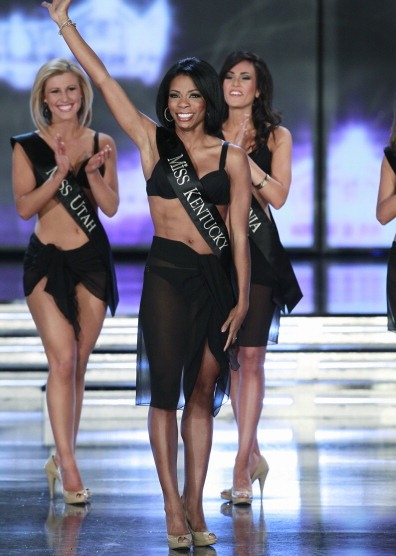
(Craig Sjodin / Disney ABC Television Group)
Andrea: Do you think that young girls competing and watching these beauty contests get an idealized vision of female beauty?
Djuan: When I was competing for Miss Kentucky I went through a period of negative changes that I thought were positive at the time. I was trying to fit a certain mold and trying to look a certain way. The thing that turned everything around for me was when I realized how much I was losing myself. If I couldn’t be Djuan Trent and hold the title of Miss Kentucky then I didn’t want it. Once I changed my mindset things turned around for me.
It can be very confusing for young girls and women to hear a message like that and see me on stage weighing twenty pounds less than I do now…. In one setting I’m saying it’s about being comfortable with yourself but then the image I’m portraying on stage is completely different. I would just have to say that getting dolled up is just part of what goes into the sport of pageants. It’s a complex issue but I’m seeing a lot of women who are part of the Miss America process trying to turn that around, trying not to make the competitions all about an ideal body image or an ideal face… The most important thing at the end of the day is what you feel comfortable with when you look yourself in the mirror.
Andrea: Then there’s the question of body image. Have you ever felt pressure to “keep up”, to lose weight or look a certain way to get ready for these competitions?
Djuan: I didn’t feel pressure per se. The only thing that someone said to me that I wasn’t on board with was telling me to wax my arms. I have hairy arms, and I’m okay with that- they’re not getting waxed. When it came to body image, I knew what was best for me. I definitely changed my workout regimen. I worked out a lot more and changed my eating habits [high protein, low carbs]. I definitely wasn’t starving myself by any means. I felt great throughout the process, I was really involved in my health but that was my experience. Post-pageant life, I think that many formers can agree that body image is a definite issue. Me and some other pageant ladies have a support system to encourage each other because no one tells you about dealing with these issues that you face after you’ve competed…Some girls go to the extreme to get their bodies to look a certain way. It’s hard to readjust to body changes after the pageants. People have jobs and obligations so you can’t work out a much and really stick to a certain diet as easily. We’ve all felt the effects of people saying things about our bodies. There are some things that carry over and body image is definitely part of it.
Andrea: How do you feel now that you’ve come out?
Djuan: I feel free and liberated. Unless you’ve been in this position you can’t understand but it’s an all-around great feeling. I feel o.k now to say girlfriend and not tip-toe around those things.
Andrea: Some in the straight community and especially older LGBT folk had a problem with you using the term “queer” as it relates to your sexual orientation. Can you reiterate to why you used the term?
Djuan: When I started to self-reflect and get more involved in myself I was looking up things and saw that some in our community used it. I really liked it, how inclusive the term was. Sexuality is so fluid… I’ve dated men in the past and it was fine but there was always something about women that I was drawn to. I’ve made a reference before about women I went to college with who were very vocal about being a lesbian and are now married to a man. The term queer is probably more fitting for women like that. It’s just a more inclusive and all-encompassing term, I feel the word just says “I’m not heteronormative”. I’m telling you I’m not straight. I don’t feel we’re attracted to a person’s reproductive organs, we’re attracted to a being, a soul. That’s not tied to gender. The term means different things to different people but I didn’t realize using the word “queer’ would be such a thing.
Andrea: You wrote a blog piece about choices. Not letting other people’s opinions dictate how you choose to live your life. Robin Roberts recently spoke to this, in that she had the choice and freedom to come out on her terms. Do you think there’s added pressure for especially black LGBTQ people in the limelight to come out?
Djuan: No I don’t think there’s a pressure there. I think it’s a personal choice…There are so many factors why people may or may not come out. I know in Robin’s case, her girlfriend wanted to remain anonymous. That’s not always the case for everyone. There are times that people come out as a result of the pressure they feel from their significant other. It’s such a personal and intricate journey; you have to do it on your own terms. People are coming out more because people are seeing that the LGBTQ community is no different from the straight community. People are realizing that gay people are your neighbors, co-workers, friends, favorite actress, people you root for in the game, even your favorite tv-host. When we make it personal it provides a sense of comfort, we no longer have to be “they” or “those people”.
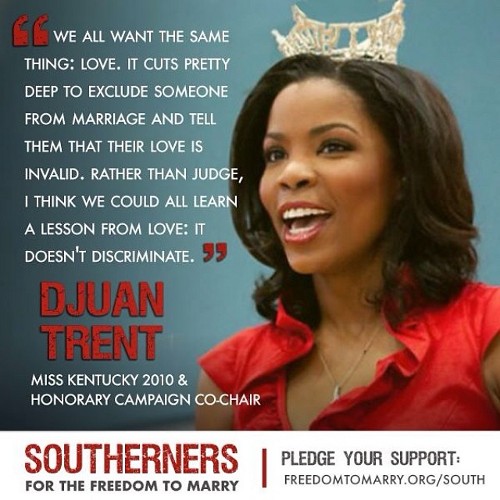
(image via Instagram.)
Andrea: For those unaware can you speak to Kentucky’s current position on gay marriage?
Djuan: Yea. Kentucky’s law doesn’t allow same sex marriage and it doesn’t recognize them from other states. A case was taken to court by some couples who were married outside of the state. It was struck down in court by Judge Heyburn who ruled that the non-recognition of marriages outside Kentucky was unconstitutional and demeaning to gay and lesbian couples. The decision is currently being appealed by the Governor but the State’s attorney general, Jack Conway, chose not to appeal the decision.
Andrea: You recently joined forces with the organization Southerners for the Freedom to Marry as co-chair. What sort of work is the organization doing to bring about change as it relates to Marriage Equality?
Djuan: I’m working on developing a sub campaign that works with Southerners for the Freedom to Marry. We’re also raising money so we can pay to have people on the ground to work with representatives, talk to people in the community. We’re basically building a network of support, forming bonds with allies. I’m also working with some other local equality groups like Power for Pride, we’ll be running a 5k during this year’s Kentucky Pride Festival.
Andrea: You are obviously passionate about LGBTQ equality, what else are you passionate about?
Djuan: I’m passionate about our youth and young adults. I do inspirational and motivational speaking. Mentorship is also really important to me, a lot of the speaking I do is around goal setting and taking advantage of educational opportunities. Writing is something I’ve recently become really passionate about. I never considered myself a writer before, but the more I do it, the more I love it.
Andrea: Lastly, what words of encouragement do you have for those in the LGBT community who are far less privileged than [we] are? People in countries the likes of Jamaica, South Africa, Uganda, etc.?
Djuan: It will get better. Someone has to stand up and be that voice however hard that may be….I encourage people to stay true to themselves, there’s no happiness in living a life of untruth.

